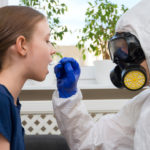
The Food and Drug Administration (FDA) has issued an Emergency Use Authorization (EUA) to Yale School of Public Health for its SalivaDirect COVID-19 diagnostic test, which uses a new method of processing saliva samples when testing for COVID-19 infection.
In June, Yale School of Public Health announced it was partnering with the National Baseketball Association to trial the test. The NBA set up a “bubble,” known as the Orlando Bubble or the Disney Bubble, to allow the NBA season to continue. It has included specific COVID-19 precautions to keep players in quarantine upon arrival until they tested negative for COVID-19 twice, isolating teams inside hotels, not allowing players nor staff in each others’ rooms, and other precautions. Participation by players was voluntary.
The Yale research team tested select players, coaches, and staff from the NBA teams that opted into the study, using the testing method they developed. The team believed the tests were not just effective, but easy to administer.
According to Yale School of Public Health, “SalivaDirect was developed this spring as an alternative to the nasopharyngeal (NP) swabbing method for SARS-CoV-2 testing. NP swabs are one of the most widely used sampling methods for the detection of respiratory pathogens such as COVID-19. But the method is invasive, involving inserting a swab deep into the nostril and into the region of the pharynx at the back of the throat. The swab is rotated to collect secretions, held in place for several seconds and removed. The sample is then sent to a certified lab for analysis.
By contrast, SalivaDirect is non-invasive and requires only a small saliva sample. The simplified method reduces testing times by over an hour. More importantly, the saliva method costs less, requires minimal training, and exposes health care workers to less or no risk, Grubaugh said. Preliminary results suggest SalivaDirect is highly sensitive, and the researchers’ goal is to optimize the method to be accurate at least 90% of the time.”
The FDA says the test does not require any special type of swab or collection device; a saliva sample can be collected in any sterile container. Yale says it is making the test available as an “open source” system, so any lab that follows the Yale protocol may process the tests.
Yale’s larger study came after an initial, small study in April that tested 44 patients and 98 public health workers.
The Hawaii company Oceanit has also been developing a saliva test that can be administered at home. If clinical trials prove effective and the test gets FDA authorization, it could be a boost to Hawaii tourism economy if it allows travelers to get a quick and reliable test upon arrival.
Photo of woman getting saliva swab courtesy Yale University School of Public Health.